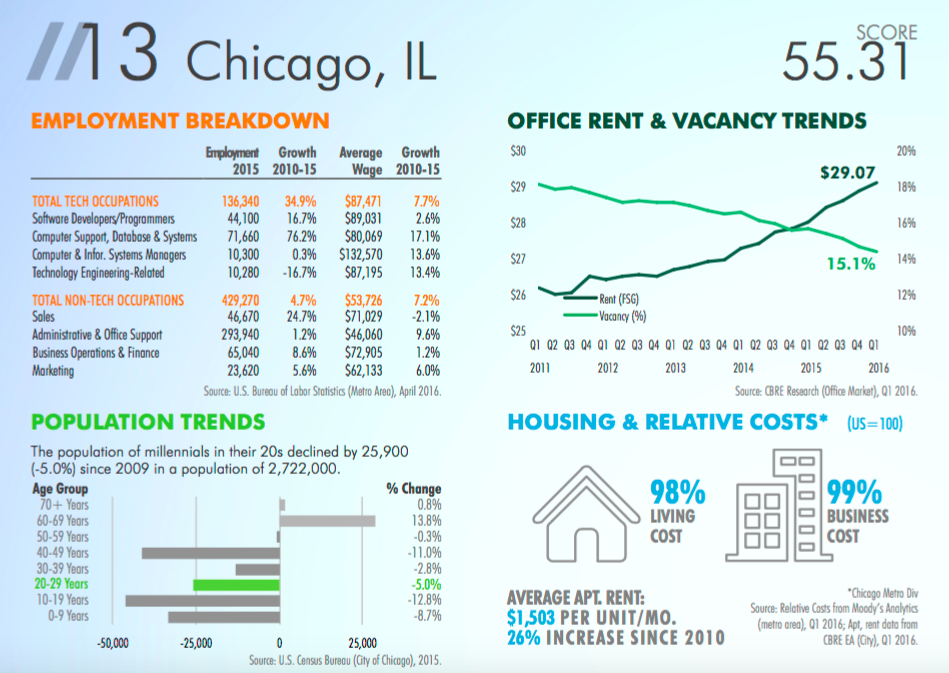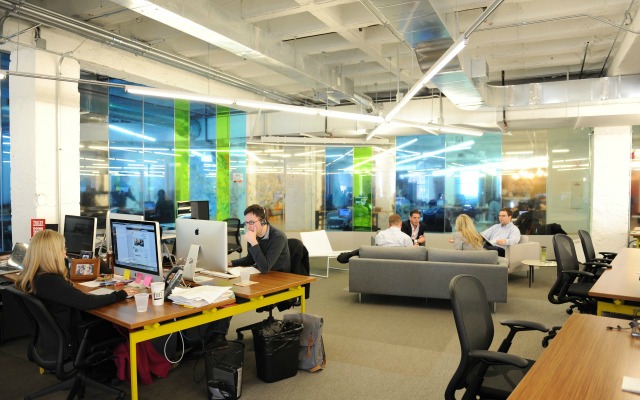Chicago's Tech Scene Is Growing, But We're Not Quite A 'Hub,' Report Says
By Gwendolyn Purdom in News on Jul 6, 2016 2:53PM
There's at least one area where Chicago isn't driving residents away: the tech sector. The city came in at No. 13 for the second year in a row out of 50 U.S. and Canadian cities on a report commercial real estate and investment firm CBRE Group published last week ranking tech industry markets. The top five markets in the report, as you might expect, are San Francisco, Washington D.C., Seattle, New York City and Austin.
The annual Scoring Tech Talent scorecard grades cities based on their ability to attract tech employees, cost of living, growth, office rent, number of tech degrees and various other factors. Chicago earned high marks for total tech employment (which jumped up 34.9 percent from five years ago), the number of tech degrees earned from 2013 to 2014 (10,454, putting Chicago as the No. 4 market in that category); cost of living (Chicago has a rent-to-tech-wage ratio of 20.6 percent in comparison to New York City’s 33.2 percent); and its level of start-up activity (the University of Illinois and Northwestern University have produced a combined 352 start-up tech firms since 2010).
“It’s almost like the perfect storm coming together and it has really propped up the tech economy [in Chicago] in a way that we haven’t seen before,” Dan Lyne, CBRE’s senior vice president of global tech and media, told us. Lyne also credited the city’s relationship with so many top-tier universities that are getting better at fostering tech students and ideas, and keeping them in Chicago, with the report’s positive findings.

A screenshot of CBRE's findings about Chicago's tech scene.
In order to improve the region’s pull as an emerging tech hub, Lyne says local companies need to develop and support a stronger pool of tech engineers and builders, as well as continue to do a better job of celebrating innovation instead of chastising failure.
“This is the underpinnings of what gets great ideas to the market,” he said. “Failure is a part of that. It wasn’t too long ago that this city wasn’t too welcoming of that.”
Howard Tullman, CEO of Merchandise Mart-base tech incubator 1871, also has high hopes for the Chicago tech industry’s future and says he thinks the city will benefit from making it clearer to more traditional companies how technology will help them transition into the future.
“There’s an absolute difference between the loyalty of the workforce in the Midwest and I don’t think we make enough of that, but on both coasts, I think even the companies would tell you very honestly the reason they compete so vigorously for talent is every one of their employees has one foot out the door,” Tullman said. “I think we in the Midwest put a much bigger premium on loyalty and long-term. So it’s just going to take a while longer.”
In addition to the pluses CBRE’s analysis cited, Tullman says he’s confident Chicago will keep climbing in the country’s mind as a tech center because its growing combination of schools, start-ups and large companies will continue to draw not just new talent, but talent that plans to stick around for a while.
“We’re seeing this boomerang effect where [tech students] left and went to the coast after they graduated from U of I or wherever it was, but now three or four years in, they’re saying where do I want to live? Where do I want to raise my family? Where did I grow up? Where did I go to school?” he said. “And when you add that all up, Chicago looks pretty good as a place to come back to.”
To read CBRE's full report, click here.
